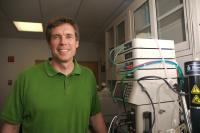FBRI Announces the Arrival of Dr. Peter van Walsum

This summer Dr. Peter van Walsum arrived at UMaine to join the Chemical and Biological Engineering Department as a part of the Forest Bioproducts Research Institute where he is leading FBRI’s biological processing research cluster. Peter holds a PhD in Biochemical Engineering from Dartmouth College, as well as Masters and Bachelor degrees in Chemical Engineering from McGill University and a BA in Geology from Williams College, MA. He comes to UMaine from Baylor University where, since 1998, he has been a part of the Department of Environmental Studies. At Baylor, he secured more than 1 million dollars in grant support from various sources in state and federal governments, as well as industry.
Dr. van Walsum has dedicated his career to research and industrial work in energy supply, production and sustainability. With industrial experience in oil production and refining and research work in conversion of lignocellulose to biofuels and bioproducts, van Walsum is enthusiastic to be contributing to the FBRI at UMaine. The expertise present at UMaine in production, handling and processing of wood feedstocks is an ideal complement to an Walsum’s expertise in bioprocessing fuels and chemicals.
Peter has long had an interest in energy issues and says “he first noticed energy issues during the ‘energy crisis’ of the early 1970’s when he was in high school. His engineer father’s strong interest in tidal power (in the Bay of Fundy) only added to Peter’s goal to find work that would create a “fit between an idea and practical applications.”
“I chose Chemical Engineering as a relevant field that would create environmental solutions,” Peter explains. “I am most interested in developing a suite of technologies, a collection of various operations that could be employed in versatile situations whether landfills, water treatment plants, farms or pulp mills. These non-sterile (and therefore less expensive) applications for the transformation of waste or underutilized bioproducts could be plugged into various industries, creating robust and commercially viable products that add more value.”
Van Walsum first worked on integrating biofuel production with the pulp and paper industry while a Ph.D. student at Dartmouth College in 1993. “The pulp and paper expertise and its strong links to the industry make UMaine the ideal site for moving my research ideas into the marketplace” says Peter. “I like to work near markets,” he explains. Given FBRI’s work to assist the retrofit of existing pulp and paper mills as biorefineries that create many types of wood bioproducts and the university’s proximity to millions of acres of forest and numerous towns with industrial capacity, the timing of Peter van Walsum’s arrival at UMaine could not be more fortunate.
